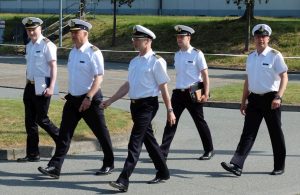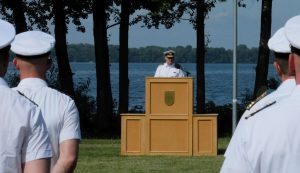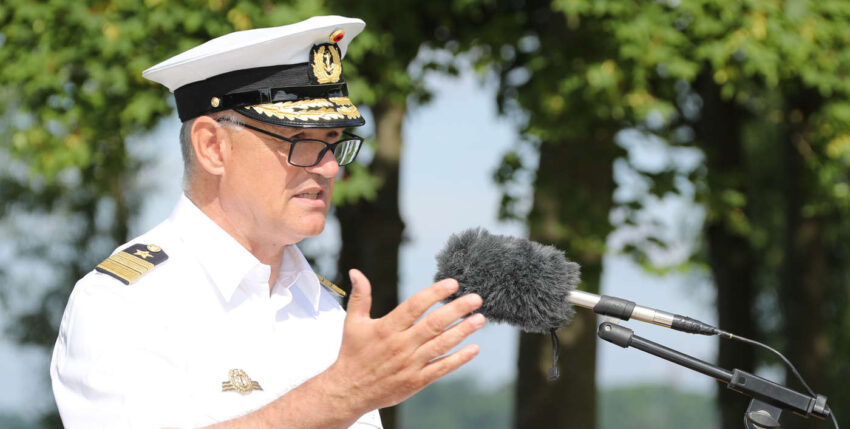"100 days in office - what matters to me"

On Friday 25 June, Vice Admiral Kay-Achim Schönbach gave his first keynote speech. He began by explaining the choice of venue - the Naval NCO School in Plön - by emphasising that the MUS is an important institution in the Navy. The petty officers and boatswains "have always been the backbone of the German Navy".
Without beating around the bush, he clearly stated that the primary goal must be to "continue to offer the navy to politicians as a reliable and versatile instrument".
The need to actively shape security policy
His assessment: "I often have the impression that our allies and partners perceive the German Navy as a toothless tiger." Its professionalism is generally appreciated, but from the partners' perspective, the German naval forces lack the willingness to act in more than just a defensive role. In view of NATO's threat analysis, this is necessary. Schönbach referred to the armament of Russia and China. The People's Republic is obviously "not only concerned with securing trade routes or making a visible contribution to conflict management, but above all with power projection".
However, the deployment of the frigate "Bayern" to the Indo-Pacific region was a first step in Germany's desire and ability to actively shape security policy. "We will be welcomed with open arms by our value partners, for example Australia, Singapore, Japan and South Korea," said the admiral. It is his intention to further consolidate this important commitment in the future.
Systemhaus See and Maritime Warfare Centre as opportunities for the navy

The naval inspector welcomed the key issues paper published by the defence minister and the inspector general in May. It provided good approaches and was an excellent opportunity for the naval forces.
He therefore initially emphasised a future system house See. "The sometimes disastrous timelines for shipyard projects could hopefully be significantly improved in this way," said Schönbach. He also welcomed a future Maritime Warfare Centre, which would bring "clear advantages for the operational readiness of the fleet as well as our future operational orientation and capabilities".
Fewer NATO naval units, but more carrier strike groups? Schönbach would like German combat ships to join allied aircraft carrier battle groups more often, just as the frigate "Hamburg" was integrated into the battle group around the USS "Dwight D. Eisenhower" in 2013.
However, the key issues paper is of course not the only thing on his mind at the moment. The admiral warned: "We are good at planning, it's just the implementation that is very difficult, which is why I can't promise any material improvement in the short term." Until new equipment such as additional corvettes, the next frigate class 126 or new maritime patrol vessels are available to the fleet, the navy will have to "live with what we have 'lying in the harbour' and accept this challenge without complaining."
Schönbach therefore focussed on the mindset of the marines. "It's not ships that fight, but people," he reminded the audience and urged: "What we can therefore do immediately is refocus on the ability and will to fight. Everything else must be subordinate to this ability. If we master high-intensity combat, all other missions are automatically downward compatible."
Willingness to take risks at all levels
In order to achieve this goal again, he asked the Inspector General to relieve the fleet's combat ships from continuous participation in the permanent NATO naval units SNMG 1 and 2 - in favour of closer cooperation with the major naval nations.
At the same time, Schönbach believes changes must be made in the shore-based departments. "Even in the concrete cruisers of the navy, the operational capability of the fleet must always be the benchmark - even at desks, we must think from the sharp end," said the inspector. Everyone in the navy makes their own important contribution to the ability to fight.
This also results in a necessary willingness to take risks, which all positions must live by. "Just as the soldier on board must be prepared to go into battle, the soldier at the desk must also be open to conflict," says Schönbach. All levels must be prepared to take responsibility. Mistakes would also happen and projects would fail, but "our error culture must also be able to deal with them".
from Marine Press and Information Centre
Download keynote speech by the Naval Inspector on 25 June 2021 PDF, not barrier-free, 101 KB
Photos: Schlüter










